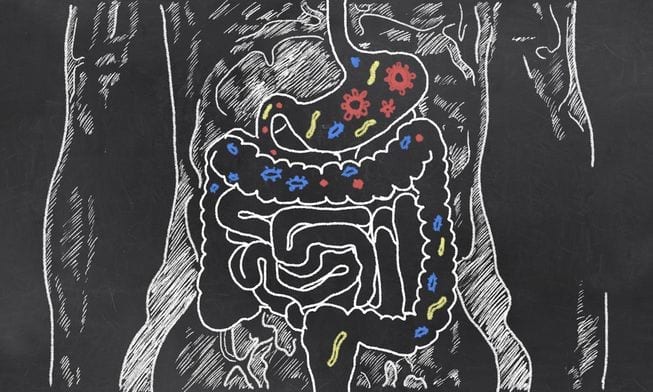Probiotics are having a moment. But as more and more people discover the health benefits these good-for-you bacteria provide, many are beginning to wonder about the source of the bacteria in their probiotic supplement.
While some probiotic strains are sourced from plants or dairy, the most common bacteria in many supplements are “human strain” probiotics.
What exactly are human strain probiotics? Despite the name, human strain probiotics don’t actually contain human byproducts or ingredients. They are simply strains of beneficial bacteria that have been found to live in the human digestive tract. That means they are already adapted to thrive in the human gut. According to research in the International Journal of Medical Science, because they are native to the human intestinal tract, they are superior to probiotics from other sources. The two most prevalent types of native bacteria in your gut and in human strain probiotic dietary supplements are Lactobacilli, which are found in the small intestines, and Bifidobacteria, which reside in the large intestines.
Why Does Gut Bacteria Matter
Let’s back up a minute and review why the bacteria in your gut actually matters. Your gut microbiota contains about 100 trillion bacteria. That’s ten times more than the cells in your body! What’s more, there are more than 3 million microbial genes in your gut microbiota—that’s 150 times more than are in the entire human genome. Without bacteria, you wouldn’t exist.
The beneficial bacteria in your intestine perform a multitude of very important tasks. Not only do the human strains that naturally live in your gut favorably alter the microflora balance in the large and small intestines, they also promote good digestion and promote healthy intestinal lining . But perhaps their best-known role is the protection they offer against harmful bacteria, fungi, and viruses. The body’s own probiotics produce organic compounds including lactic acid, hydrogen peroxide, and acetic acid that increase the acidity in your intestines. This helps to prevent the “bad” bugs from reproducing. Probiotics also produce bacteriocin, natural antibiotics that kill harmful microorganisms and enhance your immune system by boosting disease-fighting cells.
According to the International Scientific Association of Probiotics and Prebiotics, the beneficial human strains naturally found in your gut don’t simply keep pathogens at bay. They also help your body synthesize vitamins and absorb nutrients. What’s more, they interact directly with your immune system to improve your overall health.
But, while the Lactobacilli and Bifidobacteria in your gut may be the sentries of good health, a number of things can put these helpful microbes in peril. Antibiotics indiscriminately kill off bacteria—both the bad ones causing your condition and the good ones that help keep you healthy. Stress, aging, a poor diet, chemical additives, and environmental toxins can also destroy your friendly flora. When this happens, harmful bacteria can run rampant, multiplying like wildfire and ultimately causing disease. That’s why it’s essential to replenish this beneficial native bacteria every day with a viable high-quality probiotic supplement.
The probiotics in Wakunaga’s Kyo-Dophilus supplements include the human strains Lactobacillus gasseri, Bifidobacterium bifidum, and Bifdobacterium longum. This unique proprietary combination contains live strains that have been deposited in an internationally recognized culture bank, ensuring that the bacterial identity and characteristics have been well documented.
But human strains are just part of what makes a probiotic supplement effective. A probiotic won’t do you any good if it’s dead on arrival when it hits your intestinal tract. Kyo-Dophilus probiotics can survive the acidic conditions, the like those found in the stomach that can kill many other probiotics. They are also shelf-stable, packaged in glass bottles, and guaranteed viable at the time of consumption. This ensures that the probiotic you are taking delivers live beneficial bacteria to your gut. But what matters most are results. Independent testing shows that the Kyo-Dophilus family of probiotics offer real, measurable benefits—both in the lab and, more importantly, in your body.
References
Hill C, Guarner F, Reid G, et al. The International Scientific Association of Probiotics and Prebiotics consensus statement on the scope and appropriate use of the term probiotic. Nature Reviews Gastroenterology & Hepatology. 2014; 11: 506-14.
Sornplang P, Piyadeatsoontorn S. Probiotic isolates from unconventional sources: A review. Journal of Animal Science and Technology. 2016; 58:26.
Vemuri R, Shinde T, Shastri MD, et al. A human origin strain Lactobacillus acidophilus DDS-1 exhibits superior in vitro probiotic efficacy in comparison to plant or dairy origin probiotics. International Journal of Medical Science. 2018;15(9):840-8.
Wilkins T, Sequoia J, Jennings W, et al. Probiotics for gastrointestinal conditions: A summary of the evidence. American Family Physician. 2017;96(3):170-8.
This article is for informational purposes only. This article is not, nor is it intended to be, a substitute for professional medical advice, diagnosis, or treatment and should never be relied upon for specific medical advice.

Share this Post